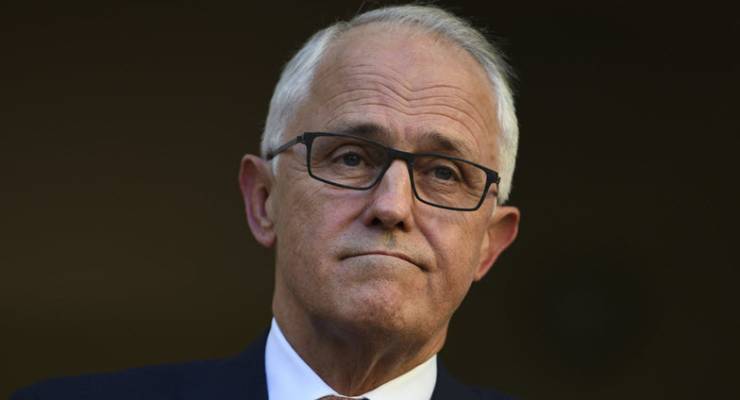
So why exactly was Malcolm Turnbull knifed again?
Ratings agency Standard & Poor’s has joined the ranks of those wondering about that in its latest assessment of the Australian economy — and in doing so, poked numerous doomsayers in the eye.
Early this year, we did a survey of the ranks of the doomsayers and some of their more hilariously wrong predictions of property crashes and recessions in Australia. It turns out, things are so awful in Australia, Standard & Poor’s restored Australia’s credit rating to the highest level — AAA with a stable outlook — and in doing so effectively endorsed the economic policies of the Turnbull government. As Crikey noted after Turnbull was betrayed by his colleagues, his economic and fiscal record, except on wage stagnation, was far better than Tony Abbott’s.
That means we are again one of the few global economies with AAA stable ratings from the major rating agencies. S&P lowered Australia’s rating to “negative outlook” in 2016, endangering the rare triple AAA status we secured on Wayne Swan’s watch; that threat has now passed, and means Australia has a higher standing than the US, which has been AAA negative since 2011.
“We expect the general government fiscal position to return to surplus by the early 2020s, as the central government’s continued focus on fiscal prudence turns higher revenue collection into better budget performance,” S&P said in a research note. “We expect steady government revenue growth supported by the strong labor market and relatively robust commodity prices, to be accompanied by expenditure restraint.
“We also expect property prices to continue their orderly unwind, and that this slowdown won’t weigh heavily on consumer spending and the financial system’s asset quality. We expect large infrastructure spending at the state government level to likely keep the general government balance negative till fiscal 2021,” it said.
A steeper and larger downturn in the housing market could place the rating at risk, or if the budget surplus is again pushed out. “Australia’s weak external position means that its other sovereign credit factors, including the fiscal factors, need to be strong to keep the sovereign rating at the highest level on our scale,” S&P said. “A stronger fiscal position would also be a strong buffer to absorb the consequences of an abrupt weakening of the housing market and the vulnerabilities that event could bring to financial stability.”
It’s the best external endorsement the Australian economy has had in a while. No wonder the Liberals can’t explain why they got rid of Turnbull.









the explanation as to why the liberals got rid of Turnbull is simple, Murdoch told them to, and after all he is the leader of the liberal party and the real prime minister of Australia even though he is not even an Australian citizen. Turnbull`s multi million dollar donation could not help him in the face of Murdochs order to remove him from office.
Actually the mudorc is a citizen of this country despite taking up US citizenship for his business needs.
The Rodent, soon after coming to office, changed the law which had mandated that Oz born, natural citizens, who swore to other allegiances abjured and eschewed that boon.
Whenever he enters this country he does so on an Australian passport.
You mean it endorses the economic leadership of the Opposition which prevented Turnbull from torpedoing the Commonwealth budget with big business tax cuts to the great benefit of foreign shareholders?
If you’re going to write a piece lauding Turnbull’s economic leadership, you could start with explaining what economic leadership he, you know, showed. What are the highly successful policies of Dear Leader, exactly?
And as for letting the ratings agencies determine what makes great economic policy- you know, the guys who rated derivatives based on subprime mortgages AAA en masse as part of the GFC – you must be joking.
Agree completely. The ratings agencies give country ratings just ot puff up their own importance, when we know that for a country that issues its own free floating fiat currency, the rating has nothing much to do with anything. Japan’s rating has been in the toilet for two decades because of their “huge govt. debt”, and dire warnings have been issued on a regular basis. All turning out to be rubbish every time. Still, the charade continues.
After the GFC how good is S&P’s rating?
“We also expect property prices to continue their orderly unwind, and that this slowdown won’t weigh heavily on consumer spending and the financial system’s asset quality …”
More or less : yes. Those with mortgages are locked in and their spending patterns will undergo no radical change. Those who have leveraged will not have a lot of spare cash but the overall correction for an utterly unrealistic market is desirable. Besides, money from this end was (and is) always a zero sum.
“A steeper and larger downturn in the housing market could place the rating at risk, or if the budget surplus is again pushed out.”
A deficit, per se, is not in itself a bad thing. It depends upon the productive capacity of the place. As to the housing market having an effect : see above. Those who are geared to hell are going to make that claim but only such people.
Lastly, as to the spilling of Turnbull, rather than play ducks and drakes with the readership Guys, refer to your own article (Bernie) on the matter – which (as a whole) wasn’t bad. The Libs, in the main, prefer the likes of Dutton and Abbot and, for that matter, the splinter parties (that occurred after the spill of Abbott). The spill occurred largely for the same reasons that Morrison canceled COAG. Turnbull’s perspective was too much in the non Liberal Right direction.
As an aside, Brian, the spill had damn all to do with Murdoch. A spill is a bit like a divorce. Third parties can accelerate the result but (only) the two principals make it happen.